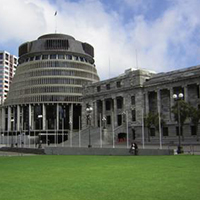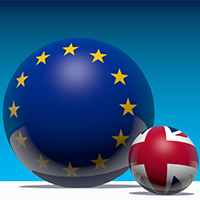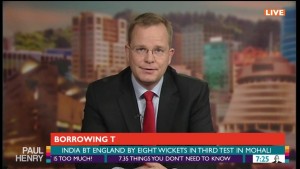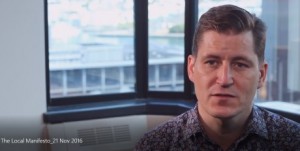
Dr Oliver Hartwich discusses Bill English and John Key
On Sydney's 2GB Radio, Dr Oliver Hartwich reflects on John Key's time as Prime Minister and looks forward to what we can expect from Bill English.
Read more


On Sydney's 2GB Radio, Dr Oliver Hartwich reflects on John Key's time as Prime Minister and looks forward to what we can expect from Bill English.
Read more

2016 has delivered some immense political shocks, raising the question just why are our politicians and institutions, and everything we once trusted, now so on the nose? To analyse this and to offer some expert forecast, Phillip Adams is joined by Greg Sheridan from the Australian, Laura Tingle from the Australian Financial Review, Dr Oliver Hartwich from the think tank The New Zealand Initiative and Beatrix Campbell, British journalist, author and playwright. Read more
There are growing concerns tonight about the economic implications of Italy's referendum result for the European Union. The win of the "no" vote is another example of a populist victory sweeping western politics. Read more

Dr Oliver Hartwich talks to Mitch Harris on RadioLive about whether Europe could fall apart before Brexit.
Read more
Wellington (1 December 2016): The New Zealand Initiative is delighted that Chris Bishop’s bill compensating live organ donors passed its third reading yesterday. Dr Eric Crampton, Head of Research with the Initiative, said “This bill will help overcome substantial financial barriers that prevent a lot of people from donating organs. Read more

Dr Oliver Hartwich talks to Mark Sainsbury about New Zealand's housing crisis and the increasing debt burden for first home buyers. This follows the announcement from the Reserve bank saying the average Kiwis are struggling with record mortgage debt - with the average amount being borrowed jumping up 43% in the last two years to $390,000. Read more
The Prime Minister and Finance Minister are keeping tax cuts on the agenda, despite not knowing the cost of last week's earthquakes. Economist Bryce Wilkinson from the New Zealand Initiative says tax cuts must be able to be fund. Read more

Research Fellow and author of The Local Manifesto, Jason Krupp, discusses some of the key findings from the final report in our series on local government. The key findings from this report provide a practical means of making local government more accountable and transparent to communities. Read more
Wellington (21 November 2016): It is time to put the government back into local government and limit central government’s interference in what councils should be doing. Let councils get on with the job, says The New Zealand Initiative. Read more
Worried about President Trump? It might not be as bad as you think. Read more
Head of Research Dr Eric Crampton discusses inequality and poverty in New Zealand following the release of our report, The Inequality Paradox: Why inequality matters even though it has barely changed. Read more
Wellington (7 November 2016): The New Zealand Initiative welcomes and supports The Human Rights Commission’s call for greater protection for citizen’s property rights in New Zealand” said executive director, Dr Oliver Hartwich. The Initiative’s Head of Research, Dr Eric Crampton, adds, “The NZHRC’s reminder that property rights are human rights could not have a better exemplar than the Christchurch Red Zone. Read more
Economist Eric Crampton is appalled by the suggestion that there be any government money put into Joseph Parker's next fight. He joins the panel to express his digust on the matter. Read more
Wellington (18 October 2016): New Zealand’s inequality crisis is actually a housing crisis, a new report by The New Zealand Initiative says. Launched today, ‘The Inequality Paradox: Why inequality matters even though it has barely changed’ finds that too many New Zealanders are suffering real hardship, and this is largely due to very high housing costs. Read more
There are ominous rumblings of another European banking crisis this evening. Germany's biggest commercial bank, Deutsche Bank, is being asked to stump up $18 billion to US authorities for dodgy dealings in the lead up to the global financial crisis. Read more